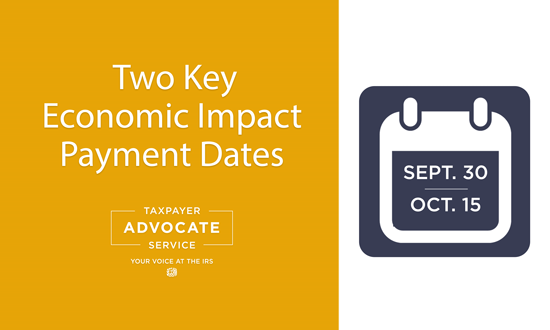
IRS takes new steps to ensure eligible individuals who normally do not have a filing requirement and have qualifying children receive $500 for each child, and other non-filers get extra time to claim their Economic Impact Payments (EIPs).
September 30, 2020
The IRS urges certain federal benefit recipients who have not used the Non-Filers tool to register online at IRS.gov using the Non-Filers tool between August 15 and September 30, to enter information about their qualifying children to receive the supplemental $500 payments.
Those eligible to provide this information include individuals with qualifying children who receive:
- Social Security retirement,
- Survivor or disability benefits,
- Supplemental Security Income (SSI),
- Railroad Retirement benefits,
- Veterans Affairs Compensation, or
- Veterans Affairs Compensation and Pension (C&P) benefits,
And who did not file a tax return in 2018 or 2019.
Remember, if you filed or plan to file either a 2018 or 2019 tax return, you should file the tax return and not use this tool.
If you already used the Non-Filers tool to provide information on children, no further action is needed. The IRS will automatically make a payment in October.
If you miss the September 30 deadline, you will need to wait until next year and claim the recovery rebate credit on your 2020 Federal income tax return.
October 15, 2020
Though most Americans have received their EIPs, eligible individuals with little or no income and who are not required to file tax returns remain eligible to receive an EIP.
People in this group should also use the Non-Filers tool, but they need to act by October 15 to receive their payment this year.
Eligible individuals who miss the October 15 deadline will need to wait until next year and claim the recovery rebate credit on their 2020 Federal income tax return.
More Information
For more information about EIPs, the due dates mentioned above, and available tools about your payment see:
- Economic Impact Payments
- IRS takes new steps to ensure people with children receive $500 Economic Impact Payments
- Economic Impact Payments Information Center
- Get My Payment tool (Use this to check on the status of your Economic Impact Payment)
- Get My Payment Frequently Asked Questions
- TAS’s Coronavirus (COVID-19) Tax Relief
- How Do I Get An Economic Impact Payment?
Follow the Taxpayer Advocate Service across social media: Twitter, Facebook, LinkedIn and YouTube.
Source: taxpayeradvocate.irs.gov

Leave a Reply